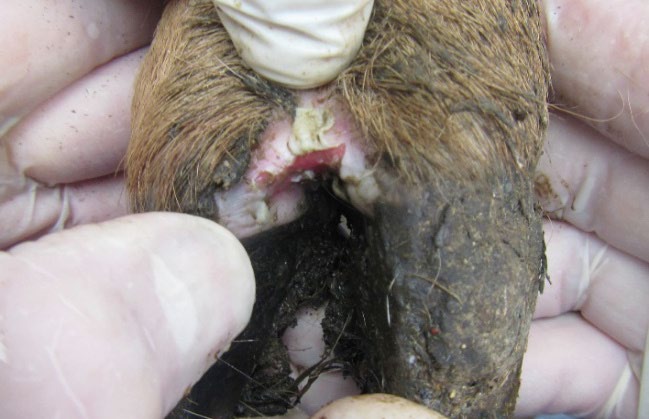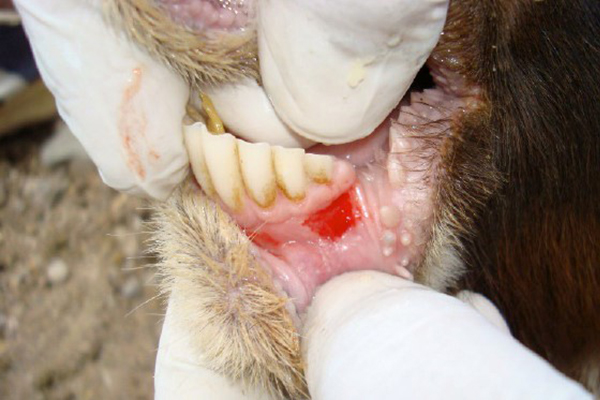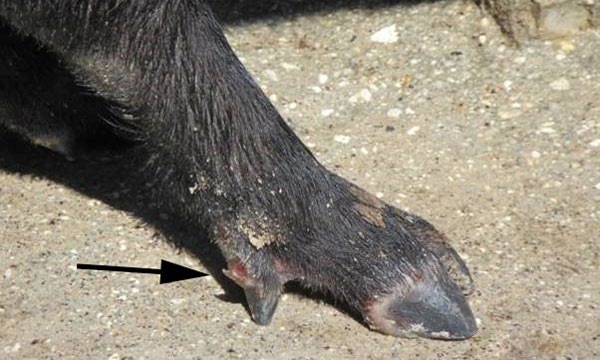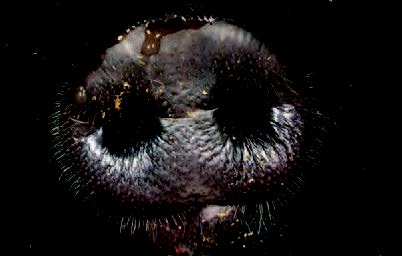
Foot-and-mouth disease
Information for hunters
Download this factsheet
(PDF, 419.84 KB)

About foot-and-mouth disease (FMD)
Foot-and-mouth disease (FMD) is a serious and highly contagious animal disease that affects all cloven-hoofed animals, both domestic and wild including cattle, sheep, goats, pigs, camelids, deer and buffalo/bison. Cloven-hoofed animals are those with divided hooves. It does not affect horses or donkeys.
FMD virus is carried by live animals and in meat and dairy products, as well as in soil, bones, untreated hides, vehicles and equipment used with these animals. It can also be carried on people’s clothing and footwear and survive in frozen, chilled and freeze-dried foods.
Know the signs
Signs of FMD may be more difficult to detect in animals with darker pigmentation and thicker skin, such as feral pigs, goats, deer and cattle (buffalo). The clinical signs may be mild and sometimes be seen only by close examination of the carcass. The most common signs are:

- Lameness or reluctance to walk
- Blisters may be present on the:
- Snout (of pigs) and mouth of all species (including the tongue and dental pad),
- Hoof - the top of the hoof or between the toes, and on the heels, and
- Teats of females
- Fever
- Salivation (drooling)
- Reduced appetite.
How is FMD transmitted
FMD virus is excreted in breath (aerosol) and all other secretions and excretions including saliva, mucus, milk, faeces, urine and semen.
Pigs, including feral pigs can become infected from eating contaminated food products, known as prohibited pig feed or swill. Food waste containing meat, meat products or mammalian by-products or food that has had contact with these can carry the FMD virus causing infection in pigs if eaten.

Pigs are ‘amplifying hosts’ as they can expel very large quantities of FMD virus.
FMD can spread through:
- Close contact between animals
- Being carried short distances by the wind or animal products (wool, hair, grass or straw)
- Mud or manure sticking to footwear, contaminated clothing, livestock equipment or vehicle tyres.
What can I do?
To keep your gear clean and reduce the risk of introducing and/or spreading a serious disease, follow these simple steps:
- Respect all quarantines and restrictions that are in place. If you’re hunting on a property with a Biosecurity Management Plan, stick to the plan.
- Don't move live feral animals to new locations.
- Come clean, hunt clean, go clean:
- Keep your camping and butchering sites clean at all times, ensuring all food waste has been secured. Take all your rubbish, especially food waste, with you when you leave.
- Thoroughly check and clean your boots. Ensure all mud, soil and debris collected during the hunt is removed and left on site, wash with detergent and water.
- Before leaving your current location, disinfect the soles of your footwear, gaiters and packs using a spray bottle filled with disinfectant.
- Care for your hunting companions, ensuring hunting dogs are up-to-date with their vaccinations, are healthy and not at risk of spreading disease. Brush their coats to remove any dirt, manure or weed seeds caught in their fur before leaving the site.

Spotted anything unusual?
If you see anything unusual in or on any animal (signs of disease) during your time hunting, report it immediately to the Disease Watch Hotline on 1800 675 888 and on your written permission harvest return (public land hunters).
All animals - domestic pets, livestock and vertebrate pests carry disease at some time. Some animal diseases such as foot-and-mouth disease (FMD) have significant socio-economic consequences, while others, zoonotic diseases such as Brucellosis, Q Fever and Leptospirosis can infect people, making them very sick.
Hunting clean takes commitment. But the risks are real. Ensure all vehicles, equipment, people and animals are clean when entering a property or public land area and clean when you leave, preventing the spread of any and all unwanted pests and diseases.
Call 1300 795 299 to speak to your Local Land Services office for further assistance in managing your biosecurity risks.
More information
NSW DPIRD foot and mouth disease
Foot and mouth disease and lumpy skin disease, Local Land Services
A Pocket Guide on FMD in feral pigs (developed by the US Pork Industry and the USDA)

